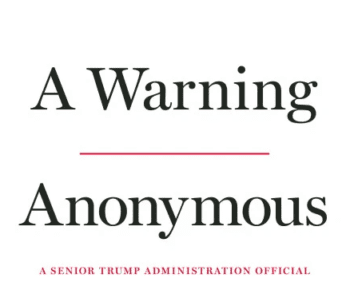
In September 2018 The New York Times made the decision to publish an anonymous op-ed from a senior official from President Donald Trump’s administration. The official, who ideologically identifies as conservative, wrote about the struggle to uphold and further Republican legislation and ideals while “thwarting Mr. Trump’s more misguided impulses until he is out of office.” A blatant critique of Trump’s leadership style, the piece serves as a warning to the American public as it also attempts to comfort them: “Americans should know that there are adults in the room. We fully recognize what is happening. And we are trying to do what’s right even when Donald Trump won’t” (“I Am Part of the Resistance,” 2018).
The op-ed was immediately met with criticism. President Trump called the unsigned op-ed “gutless,” news reporters from The Times expressed bewilderment at the editorial department’s decision to release an anonymous opinion piece, and social media bustled with chatter trying to decipher the writer’s identity. In the past, The Times op-ed department has granted anonymity to writers. However, these instances were when the writers were an undocumented immigrant or a Syrian refugee — people whose identity needed to be protected for their own safety (Calderon & Schwartz, 2018).
Criticism of the author reappeared when it was announced that the same senior Trump official would be releasing a 259-page book, titled A Warning. The book’s author is listed as “anonymous,” and the work is described as “an unprecedented behind-the-scenes portrait of the Trump presidency” (Rucker, 2019a). The Washington Post obtained the book ahead of its release, detailing revealing excerpts. In the book the anonymous author writes, “I have decided to publish this anonymously because this debate is not about me. It is about us. It is about how we want the presidency to reflect our country, and that is where the discussion should center. Some will call this ‘cowardice.’ My feelings are not hurt by the accusation. Nor am I unprepared to attach my name to criticism of President Trump. I may do so, in due course.” The Post also revealed the book does not go into detail about specific events within the administration, in an effort to protect the author’s identity. The book preview also reveals that the author does not hold back on his transparent criticisms of Trump, arguing “that Trump is incapable of leading the United States through a monumental international crisis” and “foreign adversaries see him as ‘a simplistic pushover’ who is susceptible to flattery and easily manipulated” (Rucker, 2019b).
After the announcement of the book’s release, arguments against the anonymous official again arose: journalists and media professionals questioned the ethics of granting a government official anonymity — not only for an op-ed piece but for a highly publicized book— and worried about how readers can judge the trustworthiness and veracity of the author if their identity is unknown. In response to the 2018 op-ed Ari Fleischer, press secretary for President George W. Bush, tweeted the following: “It’s impossible to evaluate how important it is without knowing how high up the author is. There are hundreds of people at the [White House] who think they’re ‘senior’ officials” (McBride, 2018). The suppression of specific details to protect the author’s identity also render such political criticisms difficult to confirm or argue against. There is also uncertainty over the status of information that the anonymous author could or should reveal. The United States Department of Justice sent a letter to the author’s publishing house, asking if the author had signed “any nondisclosure agreements while working for the government” (Stelter, 2019). The publishing house, however, said the Justice Department’s request was merely an attempt to out the identity of the author.
Journalists granting anonymity to protect a source’s identity within a news article is not a novel concept. However, news departments and opinion departments operate separately in their functions and goals. Op-ed pages of newspapers are where writers are allowed to employ their personal opinion complemented with heavy analysis of a topic and usually the weight of anonymity there doesn’t carry over the same as it would in a news story. Kelly McBride, a media ethics commentator who writes for the Poynter Institute, said about the anonymous op-ed, “If this had been a news story, we would have insisted on more details” (McBride, 2018).
Some see the senior Trump official’s anonymity as justified. When answering readers’ questions as to why The Times decided to publish the piece, op-ed editor James Dao said it was to give readers a unique perspective on the Trump presidency “of a conservative explaining why they felt that even if working for the Trump administration meant compromising some principles, it ultimately served the country if they could achieve some of the president’s policy objectives while helping resist some of his worst impulses” (“How the Anonymous Op-Ed Came to Be,” 2018). Representatives involved in the author’s book project have remained protective of the author’s identity (Rucker, 2019a). Matt Latimer, co-founder of the literary agency publishing the anonymous author’s book, said the book “was not written by the author lightly, or for the purpose of financial enrichment. It has been written as an act of conscience and duty” (Tapper, 2019).
Some have even made remarks that the op-ed author’s newest work will do more to help confirm unsubstantiated revelations from the Trump White House. Jack Shafer, senior media writer at POLITICO, gave the example of how the author’s op-ed spoke about the possibility of a group within the Trump cabinet invoking the 25th Amendment to invoke removal of the President. A couple of weeks later, reporters with The Times confirmed the formation of the group (Shafer, 2019). Shafer said, “This steady confirmation of the op-ed’s key points by the best journalists covering the Trump administration makes it easy to award A Warning a four-star, prepublication review and predict that it will serve as a revelatory text” (Shafer, 2019).
Despite such lauding of A Warning and explanations in defense of the author’s anonymity, ethical questions still remain: is it ethical for a person unwilling to share their identity to solicit attention from the public, and should media and literary gatekeepers grant anonymity to a senior Trump official about their function within the administration?
Discussion Questions:
- What are some of the benefits of secret, or hidden, Facebook groups?
- What are the ethical issues that arise from participating in a secret Facebook group?
- How might a secret Facebook group be different from a physical in-person organization or club created to support like-minded individuals? Would the same ethical issues arise? Why or why not?
- Would Facebook getting rid of the secret Facebook function be good for democracy? Why or why not?
Further Information:
Correal, Annie. “Pantsuit Nation, a ‘Secret’ Facebook Hub, Celebrates Clinton.” The New York Times, November 8, 2016. Available at: https://www.nytimes.com/2016/11/09/us/politics/facebook-pantsuit-nation-clinton.html
Dreyfuss, Emily. “Secret Facebook Groups Are the Trump Era’s Worst, Best Echo Chamber.” Wired, January 20, 2017. Available at: https://www.wired.com/2017/01/secret-facebook-groups-trump-eras-worst-best-echo-chamber/
Dwoskin, Elizabeth. “‘Facebook says private groups are its future. Some are hubs for misinformation and hate.” The Washington Post, July 5, 2019. Available at: https://www.washingtonpost.com/technology/2019/07/05/facebook-says-private-groups-are-its-future-some-are-hubs-misinformation-hate/
Engel, Pamela. “‘People want it to be true’: Inside the growing influence of a mysterious anti-Trump website.” Business Inisider, May 16, 2017. Available at: https://www.businessinsider.com/the-palmer-report-bill-louise-mensch-2017-5
Lee, Dami. “Facebook is simplifying group privacy settings and adding admin tools for safety.” The Verge, August 14, 2019. Available at: https://www.theverge.com/2019/8/14/20805928/facebook-closed-secret-public-private-group-settings
Silverman, C., Lytvynenko, J., & Thuy Vo, L. “How Facebook Groups Are Being Exploited To Spread Misinformation, Plan Harassment, And Radicalize People.” Buzzfeed News, March 19, 2018. Available at: https://www.buzzfeednews.com/article/craigsilverman/how-facebook-groups-are-being-exploited-to-spread
Authors:
Allyson Waller & Scott R. Stroud, Ph.D.
Media Ethics Initiative
Center for Media Engagement
University of Texas at Austin
January 22, 2020
Image: Cover Image by Twelve Books
This case study is supported by funding from the John S. and James L. Knight Foundation. It can be used in unmodified PDF form for classroom or educational settings. For use in publications such as textbooks, readers, and other works, please contact the Center for Media Engagement.
Ethics Case Study © 2020 by Center for Media Engagement is licensed under CC BY-NC-SA 4.0



